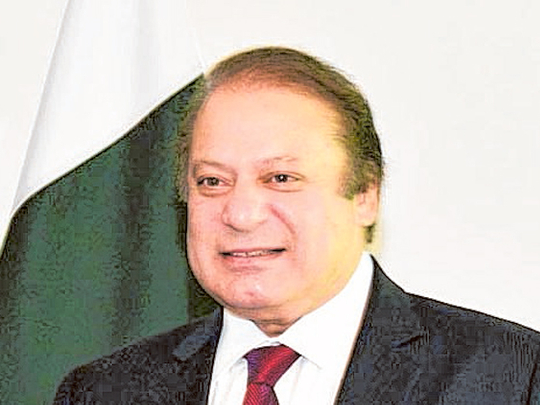
Boao, China: Pakistani Prime Minister Nawaz Sharif has said the revival of the Silk Road can help boost economic growth and prosperity in the region.
Sharif was speaking on the opening day of Boao Forum for Asia 2014, in China on Thursday.
During a session titled “Reviving the Silk Road — A dialogue with Asian Leaders” , the Prime Minister said Pakistan, as a country located at the southern edge of the New Silk Road, recognises that political and economic dividends of this vision were unparalleled, both in scale and potential.
The Prime Minister praised China’s President Xi Jinping for proposing a visionary concept of the New Silk Road last year and renewing everyone’s interest in the subject.
Sharif said reviving the Silk Road in today’s world of passports, visas and intricate tariff regimes, required ingenuity both in policy formulation and policy application.
He said the policy could be based upon four elements — coordination to ensure mutually beneficial endeavours in peaceful and secure settings; the introduction of cohesive laws and regulations regarding movement of people and goods, tax policies and tariff/non-tariff barriers; regional infrastructure for better connectivity by building better transport networks and convertibility of currencies and uniformity in financial and banking sectors.
The Prime Minister said Pakistan’s geographical location supplements the potential of the Silk Road and enhances the scope of its revival.
“Our geography links China and the New Silk Road to the warm waters of the Arabian Sea and the Arabian Gulf. This is the linear dimension of our relevance with the Silk Road,” he said.
Sharif said Pakistan is at the confluence of China, the Eurasian land-bridge and the Middle East, which enables it to be a three-pronged economic corridor between the three regions.
This is what made it relevant on the Silk Road, he added.
Pakistan’s long coastline also makes the ports of Karachi and Gwadar strategic crossing points on the maritime Silk Road, Sharif added.
Sharid said Pakistan and China were active partners in reviving the concept of Silk Road and added that work, in this regard, had already commenced since two new governments assumed office in respective countries last year.
The Prime Minister said the Pakistan-China Economic Corridor is the southern extension of the New Silk Road and in the course of the last ten months, the two countries had achieved a broad consensus on planning various infrastructure and energy projects under the project of the Economic Corridor.
He said the China-Pakistan Economic Corridor was an instrument for alleviating poverty for millions of people by providing alternative sources of jobs and incomes.
The Pakistan leader said his country realised that partnership in the Silk Road would entail a robust infrastructure, regular energy supply and improved overall governance and for this reason, had positioned itself to fulfil these yardsticks.
His government, in it first year in office, had already sought to improve governance and had undertaken sound economic policies, Sharif said, adding the liabilities in the electricity sector were cleared last year and the acute energy shortfall reduced.
He said the government had embarked upon an economic rebuilding plan and also presented an austerity budget by cutting
wasteful and unnecessary expenditure, abolished discretionary grants and minimised subsides.
The Prime Minister mentioned that to increase the business footprint in the country, the government had a deregulation plan in place that included a greater role of private equity in business.
He said that Pakistan ranks the highest in the region in terms of ease of business.
He welcomed finances and expertise in Pakistan from China and from greater Asia, both in public and private sectors and assured full security for human and financial resources invested in Pakistan.
Prime Minister Sharif stressed that to achieve an efficient Silk Road, there was need to invest in peace and mutually benefiting diplomacy.
“We must strengthen bilateral and multilateral mechanisms, to settle outstanding disputes, through peaceful means,” he said.
He said Pakistan believed that the Shanghai Cooperation Organisation (SCO), with its diverse membership and strong institutional framework, was well positioned to promote peace and security, in the wider neighbourhood.
He said the SCO was playing an important role in settling disputes and managing conflicts which would help revive the Silk Road.
Yang Jiechi, State Councilor of China and Zhang Guobao, Chairman Advisory Board, National Energy Commission of China also spoke on the occasion.












